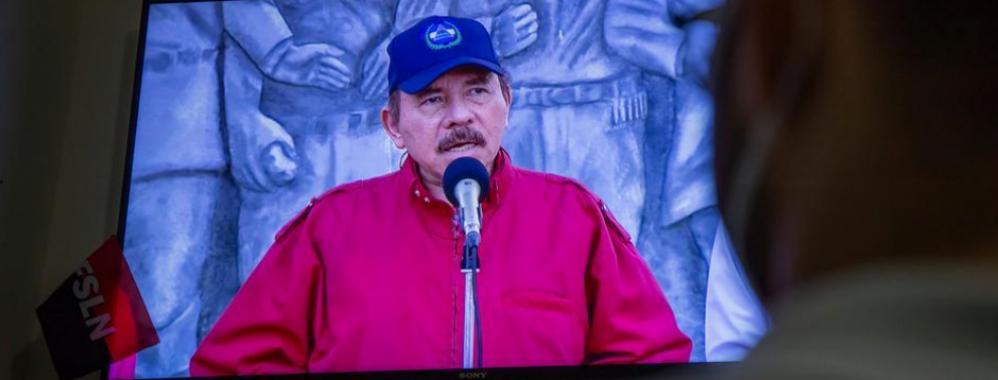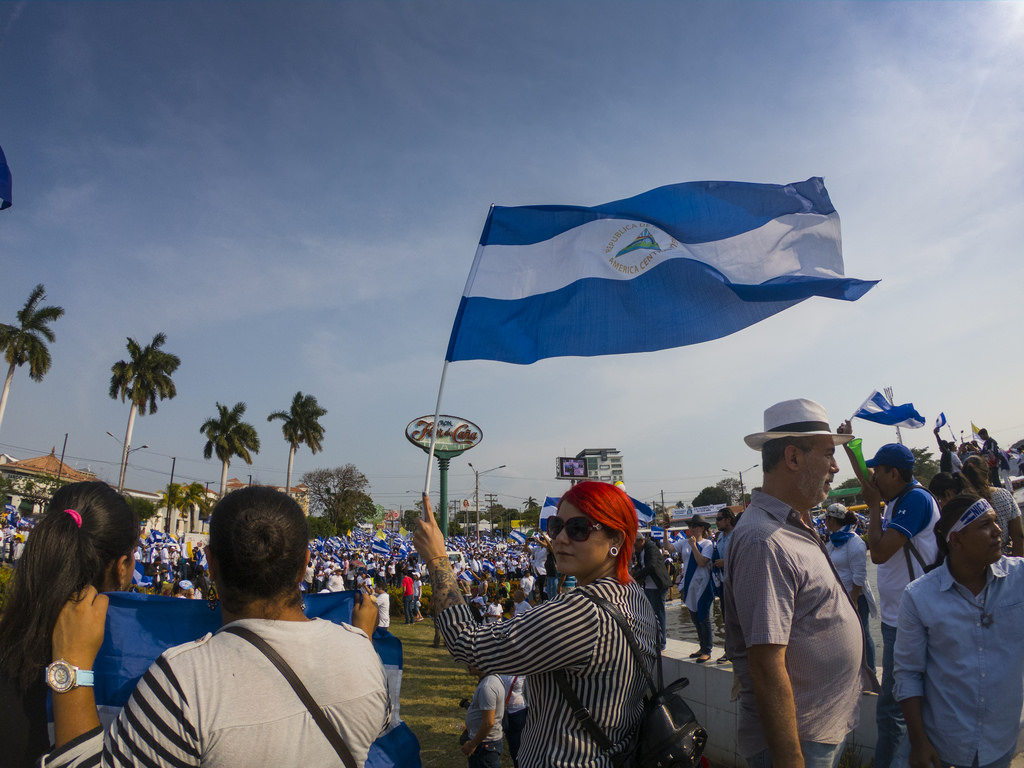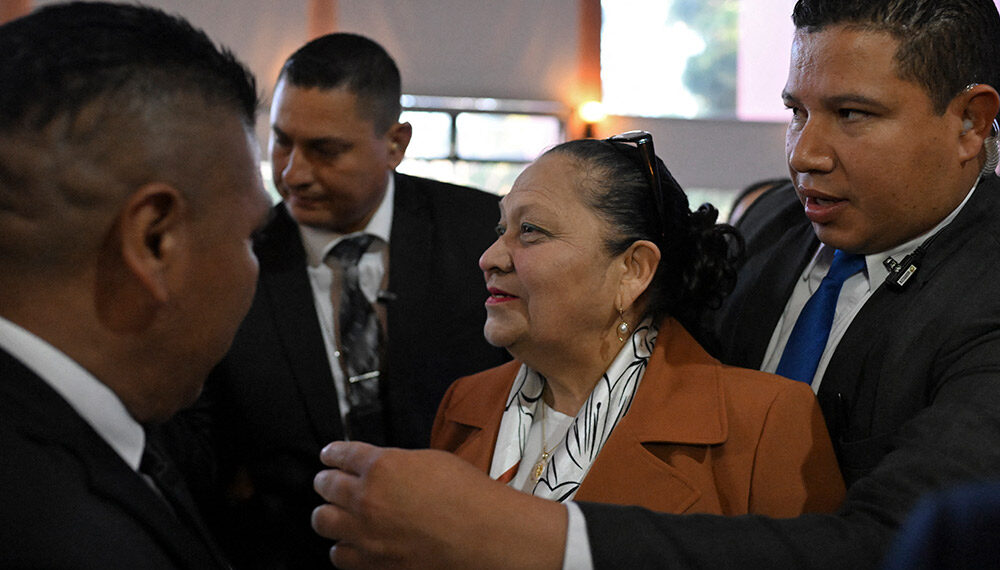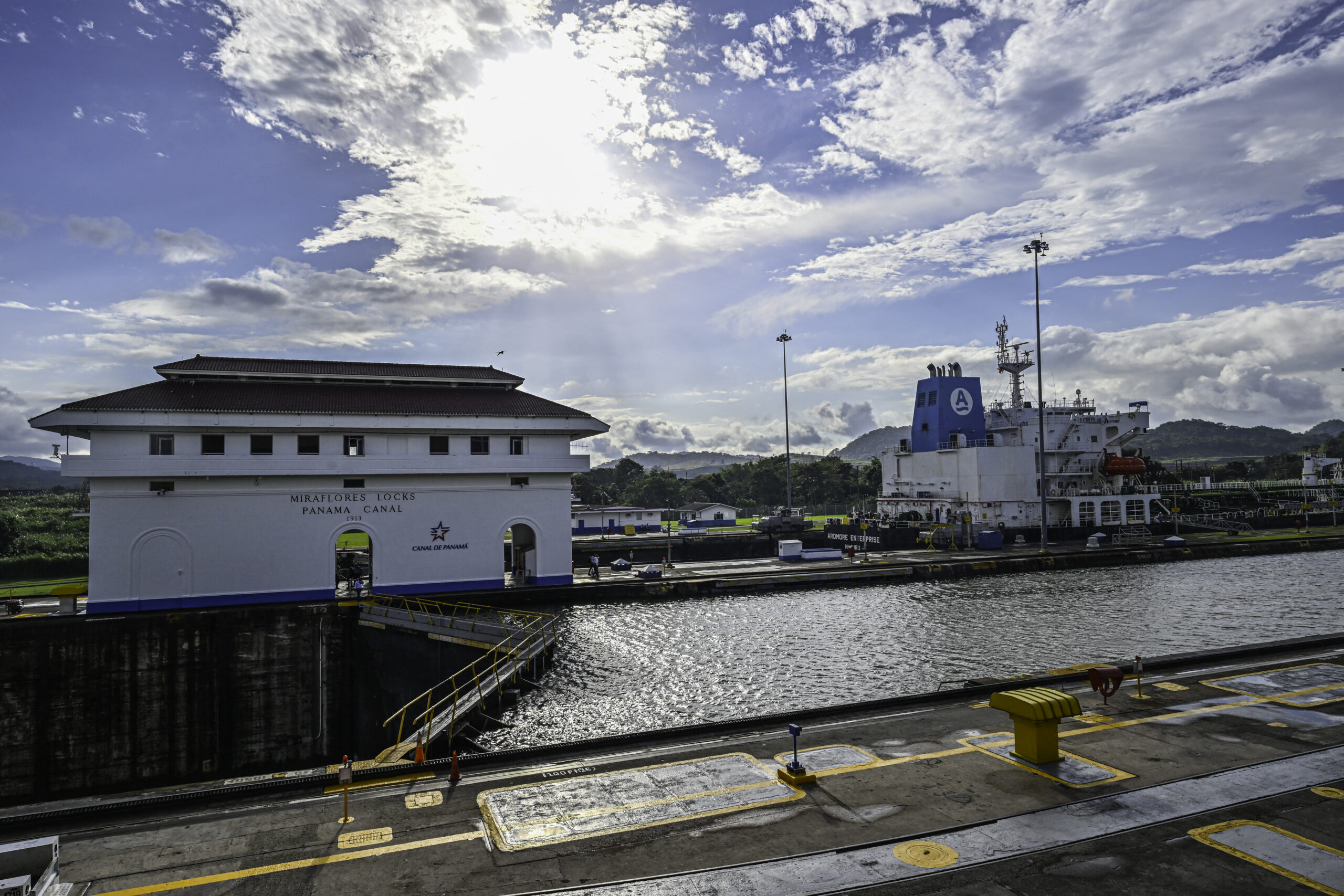Central America
EU, US widen Nicaragua sanctions as Ortega begins new term

AFP
Daniel Ortega was sworn in Monday as Nicaragua’s president for a fourth straight term as the EU and US tightened sanctions over impugned elections held in November with all his challengers in jail.
“Yes, I swear,” said strongman Ortega as he and his wife Rosario Murillo, who was re-elected vice-president, were sworn in at a ceremony attended by the presidents of Cuba and Venezuela and envoys from China, Russia, Iran, North Korea and Syria, among others.
Even before the event got under way, the European Union announced fresh sanctions against individuals it accuses of “undermining democracy” and human rights abuses in Nicaragua, including Ortega’s daughter and a son — both working as presidential advisors.
Others sanctioned “in view of the worsening situation in Nicaragua” were senior officials of the country’s police force and electoral body, said the EU.
In Washington, the US Treasury placed sanctions on six regime officials, including two generals, the defense minister, the head of the Supreme Electoral Council and officials of the telecommunications regulator, who allegedly ran a social media troll farm to help Ortega.
Travel restrictions were imposed on 116 individuals tied to the regime, including mayors, prosecutors, security and university officials “complicit in undermining democracy,” US Secretary of State Antony Blinken said in a statement.
In his inaugural address, Ortega, 76, mocked the sanctions, calling them a “decoration” for Brenda Rocha, the electoral council head, who was one of the officials sanctioned.
He called the US measures “cowardly” and “cruel (…) not just to Nicaragua” but also to Cuba and Venezuela, which have also been subjected for years to “brutal sanctions” that he said must cease.
– Russia and China –
In the months leading up to the November 7 vote, Nicaraguan authorities detained nearly 40 opposition figures, including seven would-be presidential challengers, assuring victory for long-time ruler Ortega.
As the international community rained opprobrium and sanctions on Ortega, he sought to improve ties with economic giants China and Russia.
Managua switched diplomatic recognition from Taiwan to Beijing, in return for which China reopened its embassy in the Central American nation and donated thousands of coronavirus vaccines.
Moscow, in response to outreach from Managua, provided the country with wheat, vaccines, even buses for public transport.
A firebrand Marxist in his youth, Ortega ruled Nicaragua from 1979 to 1990, after leading a guerrilla army that ousted US-backed dictator Anastasio Somoza.
Returning to power in 2007, he has won re-election three times, becoming increasingly dictatorial and quashing presidential term limits.
Ortega, with Murillo on his ticket, garnered 75 percent of the vote in November.
The election took place without independent international observers and with most foreign media denied access to the country.
The Nicaraguan parliament is dominated by Ortega allies, who also control the judiciary and electoral bodies.
Days before the election, Facebook announced it had closed a Nicaraguan government troll farm spreading anti-opposition messages.
Besides Rocha, the head of the Supreme Electoral Council, the European Union also imposed sanctions on the council’s deputy head and a senior official who was acting chief in 2018.
The country’s telecoms enterprise was also listed for its bid “to silence independent media” and spread “disinformation.”
– ‘Sham’ –
US President Joe Biden has slammed the vote as a “sham” and the Washington-based Organization of American States (OAS) said it was “not free, just or transparent.”
As sanctions were almost immediately announced by the US, EU, Canada, and Britain, Russia attacked the West for not recognizing the results.
“We consider this unacceptable and we strongly condemn such a stance,” Russian Foreign Minister Sergei Lavrov said in November.
The US State Department says Ortega’s regime continues to hold 170 political prisoners.
They include some 120 people who participated in anti-government protests in 2018 that were brutally repressed, causing more than 300 deaths and sending more than 100,000 people into exile, according to the Inter-American Commission on Human Rights.
Ortega insists the jailed are criminals and “terrorists” seeking to overthrow him with help from the United States.
Dozens of Nicaraguan exiles protested in neighboring Costa Rica on Sunday against Ortega’s inauguration.
The protest came on the same day that Nicaragua’s new parliament, also elected in November and dominated by Ortega’s left-wing Sandinista National Liberation Front, was officially opened.
Central America
Nicaragua Held Responsible for Harassment of Opposition Prosecutor and His Family

The Inter-American Court of Human Rights on Wednesday found Nicaragua responsible for threats, harassment, and attacks suffered by opposition election monitor Jaime Antonio Chavarría and his family after he reported irregularities during the July 27, 2008 municipal elections.
Chavarría was serving as an electoral verification prosecutor for the opposition Constitutional Liberal Party at a polling station in Managua on election day. He filed a formal objection with local authorities, complaining that the polling center had closed before the scheduled time while voters were still waiting to be verified.
According to the ruling, Chavarría and several relatives present at the site were subjected to insults and threats by a representative of the ruling Sandinista National Liberation Front (FSLN). As they were leaving the area, they were intercepted and attacked by a large group of individuals allegedly incited by local Sandinista leaders.
“The events were witnessed by police officers who refrained from intervening. Mr. Chavarría Morales and his relatives, who suffered various injuries, managed to escape in their vehicle, which the aggressors attempted to set on fire,” the court detailed.
Chavarría reported the incident to the National Police, but the case was ultimately shelved in May 2016. Acts of harassment and intimidation continued over time.
The court concluded that the State bore responsibility for the threats, harassment, and subsequent attacks following July 2008, citing the participation or acquiescence of state agents in some of the incidents, as well as the failure to adopt protection and investigative measures.
In its judgment, the court determined that Nicaragua violated Chavarría’s rights to personal integrity, freedom of thought and expression, political rights, equality before the law, and the right to defend human rights.
The ruling also established state responsibility for violations affecting the personal integrity, judicial guarantees, judicial protection, and family protection rights of Chavarría and for the harm caused to the life plans of his children: Cindy Alicia Chavarría Alonso, Jeffer Joaquín Chavarría Alonso, and Jaime Antonio Chavarría Alonso.
Central America
Guatemala’s Attorney General Fails in Bid for Top Court Seat Amid Corruption Allegations

The Attorney General of Guatemala, Consuelo Porras, failed on Tuesday in her bid to join the country’s highest constitutional court, a position that would have granted her immunity from corruption allegations for which she has been sanctioned by the United States and the European Union.
Porras, whose term as attorney general ends in May, did not receive a single vote in the final round of voting to become a magistrate of the Corte de Constitucionalidad, whose rulings are final and cannot be appealed.
The Supreme Court reelected Dina Ochoa and Claudia Paniagua as its representatives to the Constitutional Court.
Ochoa is considered close to former presidents Jimmy Morales (2016–2020) and Alejandro Giammattei (2020–2024), both accused of corruption. Paniagua, like Porras, has been sanctioned by the United States.
Washington and the European Union have labeled Porras as “corrupt” and “undemocratic,” accusing her of attempting to block the inauguration of Social Democratic President Bernardo Arévalo two years ago.
In addition, the 72-year-old attorney general—who is seeking a third term—has been accused of forcing anti-corruption officials, journalists, and social leaders into exile. She denies the allegations and claims they are part of a political persecution campaign.
Porras’ chances of remaining in office, a position she has held since 2018, are considered slim, as President Arévalo is responsible for appointing the next attorney general.
Central America
Panama Canal Monitoring Trade as Middle East Conflict Disrupts Shipping

The Panama Canal Authority (ACP) said Monday it is closely monitoring global maritime trade developments following the conflict triggered by joint U.S. and Israeli strikes against Iran.
However, the ACP described it as “premature” to predict potential consequences for vessel traffic through the interoceanic waterway, which handles roughly 5% of global maritime trade.
“The Panama Canal continuously monitors the evolution of international maritime trade and the dynamics that may influence its flows,” the authority said in a statement. The canal’s main users are the United States and China, connecting primarily the U.S. East Coast with Asia, including South Korea and Japan.
The ACP emphasized that the canal “continues to operate safely, efficiently, and reliably,” providing uninterrupted service to the global maritime community.
Global Shipping Disruptions
The U.S.-Israeli military operation against Iran and Tehran’s retaliatory actions have disrupted global maritime traffic, particularly oil tanker routes.
Shipping giants Maersk and CMA CGM have suspended transits through the Strait of Hormuz as well as crossings via the Suez Canal, the key route linking the Mediterranean Sea and the Red Sea.
As a result, cargo vessels are now rerouting around Africa to reach Europe from the Middle East and Asia — a detour that adds several thousand kilometers and several days to voyages.
-

 International4 days ago
International4 days agoIran Reports 201 Dead, 747 Injured After U.S. and Israeli Strikes
-

 International3 days ago
International3 days agoBrazil’s Supreme Court Rejects Bolsonaro’s Bid for House Arrest
-

 International4 days ago
International4 days agoPope Leo XIV Urges End to ‘Spiral of Violence’ in Middle East
-

 International5 days ago
International5 days agoSecurity Council to Hold Emergency Meeting on Middle East Crisis
-

 International3 days ago
International3 days agoAnti-ICE Billboard Campaign Targets Immigration Spending in 31 U.S. Cities
-

 Sin categoría5 days ago
Sin categoría5 days agoTrump: ‘We Think It’s True’ Amid Claims Iran’s Supreme Leader Was Killed
-

 International2 days ago
International2 days agoSpain’s Prime Minister to Address Nation Amid Trump’s Trade Threats
-

 International3 days ago
International3 days agoTrump Warns of ‘Major Wave’ of Attacks as Iran Conflict Escalates
-

 International3 days ago
International3 days agoMexico Calls for Immediate Probe After National Dies in ICE Custody
-

 International15 hours ago
International15 hours agoWhite House Says Spain Agrees to Cooperate with U.S. Military After Trump Threatens Trade Embargo
-

 International3 days ago
International3 days agoBolivia Orders Three Investigations Into Deadly Military Plane Crash
-

 International2 days ago
International2 days agoNew York Announces First 2,000 Seats in Universal 2-K Program
-

 Central America3 days ago
Central America3 days agoPanama Canal Monitoring Trade as Middle East Conflict Disrupts Shipping
-

 International15 hours ago
International15 hours agoSpain Denies Any Agreement to Cooperate with U.S. Military in Iran Operations
-

 Central America15 hours ago
Central America15 hours agoNicaragua Held Responsible for Harassment of Opposition Prosecutor and His Family
-

 International2 days ago
International2 days agoWarner Bros. Developing First ‘Game of Thrones’ Movie With ‘Andor’ Writer
-

 Central America2 days ago
Central America2 days agoGuatemala’s Attorney General Fails in Bid for Top Court Seat Amid Corruption Allegations
-

 International14 hours ago
International14 hours agoClaudia Sheinbaum: Operation Against ‘El Mencho’ Was Based on Pending Arrest Warrants




























